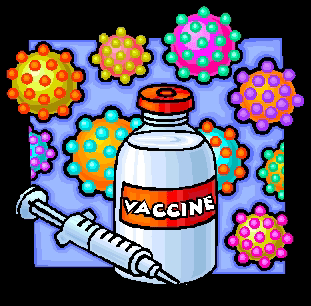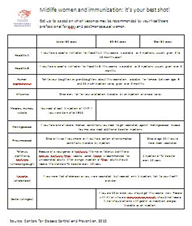Vivien Brown, MDCM, CCFP, FCFP, NCMP
 Vaccinations have improved the health of babies and children by preventing deaths from illnesses. They have also transformed women’s health by lowering risk of gynecological and anal cancers with the human papillomavirus (HPV) vaccine given to young women. Once we reach adulthood, women may think we are finished with vaccines. However, getting immunized is a lifelong responsibility. Make sure you’ve had all the vaccinations you need—here are several excellent reasons to ask your healthcare provider about immunization:
Vaccinations have improved the health of babies and children by preventing deaths from illnesses. They have also transformed women’s health by lowering risk of gynecological and anal cancers with the human papillomavirus (HPV) vaccine given to young women. Once we reach adulthood, women may think we are finished with vaccines. However, getting immunized is a lifelong responsibility. Make sure you’ve had all the vaccinations you need—here are several excellent reasons to ask your healthcare provider about immunization:
- You haven’t checked your record in years: Adults need routine boosters every 10 years because our immune systems are less robust and we may not have sufficient antibodies to fight off diseases.
- Your occupation or lifestyle exposes you to infection: You may be more at risk for some diseases through contact with other people. Risky occupations include those involved with large groups, such as hospital employees, teachers, and those in the service industries, as well as caregivers and healthcare providers frequently exposed to people who are ill.
- You have a medical condition: People with chronic conditions like diabetes or asthma are more at risk for preventable illnesses such as pneumonia.
- You are a parent or grandparent: By being immunized, you protect the infants you care for as they are a high-risk group and take at least the first year of life for their own immunity to be strong.
- You are a gardener or work with the soil: Tetanus is in the soil and exposure is a significant risk that can be prevented.
- You travel and visit other countries: Other countries have other risks and diseases not seen as frequently in North America, such as typhoid fever, hepatitis, and meningitis.
- You want the best protection against preventable diseases, from both infections and cancers: How exciting that we are now learning how to prevent not only infections like measles and chickenpox, but also how to reduce the risk of gynecologic cancers like cancer of the cervix and of the vagina.
Valuable vaccinations for midlife women
Your healthcare provider may not routinely check your immunization history or recommend shots, so here’s your chance to get up to speed on which vaccines are recommended for peri- and postmenopausal women:
 |
| Download this handy chart about immuization for women |
Influenza. Every fall, influenza shots are recommended to all women age 50 and older, younger women with chronic disease, and any adult simply wanting to reduce their risk of influenza. A nasal spray vaccine (FluMist) is also available, however, after age 49, most women should have an annual injection.
Tetanus diphtheria. After immunization in childhood, you should receive the tetanus diphtheria (Td) booster every 10 years. Age 50 is a good time to get a booster vaccination if you cannot remember your last one. Because of a resurgence of pertussis (whooping cough), a single dose of the newer Td acellular pertussis (Tdap) vaccine is recommended for unvaccinated adults under age 64.
Pneumonia. Everyone over age 65 should receive this immunization, but patients with chronic diseases such as diabetes or asplenia, HIV, malignancies, sickle cell disease, renal failure, or who have had long-term glucocorticoid therapy, should receive it more often.
Shingles. Zoster vaccine live is for shingles and is indicated for adults who have already had chickenpox but not shingles and are age 50 or older. People with HIV or who are immunocompromised should not receive this live attenuated (ie, weakened but still living) vaccine, nor should anyone with gelatin or neomycin allergies.
Human papillomavirus. Even though midlife women are well past the age of requiring the HPV vaccination, many women ask their physicians for advice regarding their daughters ages 9 to 26. Two different vaccines, Gardasil and Cervarix, are available to protect against dangerous strains of HPV.
Meningitis, hepatitis A, hepatitis B. For peri- and postmenopausal women traveling to exotic locations, certain vaccinations (eg, meningococcal and hepatitis A and B) should be considered. These women may best be served by a referral to a travel clinic for additional recommendations. The Centers for Disease Control and Prevention also provide information to assist travelers (see below).
Measles/mumps/rubella (German measles). For anyone born after 1956, one or two shots are advised from ages 19 through 49 followed by a booster, unless there are lab tests showing immunity from prior infection or vaccination. A second dose is needed after 4 weeks if exposed to a measles or mumps outbreak.
Varicella (chickenpox). If you’ve never had chickenpox, a two-dose series is available. If you only had one shot, a booster shot is available.
For even more information, visit:
Image credit: Copyright © Microsoft. Used with permission.